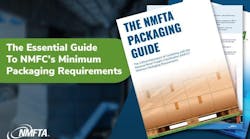In today's cost-driven environment, private fleet “justification” has, for all practical purposes, become a per-run, per-day drill event for managers of even the most proven and long-standing fleets. National benchmarks to measure how well an individual private fleet stacks up against best-in-class metrics help take the guesswork out of this process.
The National Private Truck Council's 2010 Annual Benchmarking Survey, sponsored by PeopleNet, is designed as a “must have” assessment tool for fleets of all sizes and scope. The survey examines a number of key performance metrics such as driver turnover; trailer-tractor ratios; slip-seating usage; onboard technology usage; backhaul capacity; private fleets with for-hire authority; trade cycles; customer service; and driver compensation. The goal of this exercise is to affirm areas of excellence and uncover opportunities for improved performance.
The survey is not intended as a critique to “pass judgment” on a private fleet; rather, it is designed as a template by which a fleet can gauge its performance against comparative peer data. A fleet's cost per mile might be higher than the national average, for example. But a careful analysis may reveal this to be not inefficiency but simply the realistic price to be paid in delivering ultra-premier customer service.
The survey also provides an overall look at private fleet trends and profiles. Last year's survey reported that private fleets continue to represent the largest sector of the trucking industry, according to data gathered from FleetSeek.com. Some 200,000 companies (not including farmers) operate private fleets in the U.S. as an extension of their primary business. Of these companies, 150,000 have fewer than ten power units.
The enormous presence of private fleets used by American corporations of all sizes and locations is in itself a significant testimony to the private fleet's value. Individual private fleets, however, ultimately succeed or fail on the strength of their own performance. The key to success often rides on finding weak spots and making improvements — again an important value of the survey.
Participating companies in the survey can be assured of complete confidentiality — an essential standard in attracting and keeping private fleets as participants. A company's responses will not be shared with other companies; rather, data submitted is combined with the results of other fleet member companies to produce a “state of industry” report.
Each year, the survey is refined and improved. In 2010, for example, we are adding questions on the value of fleet graphics; texting policies; environmental “green” policies; fuel tax and the use of team drivers.
To make the survey even more meaningful, member companies are encouraged to submit separate surveys for each distinct operation, such as direct-store deliveries, interplant, long-haul, etc. Data from huge operations are not co-mingled so as to skew overall averages.
A preliminary report of the 2010 Benchmarking Survey was made at the NPTC Annual Conference in April, and the final report will be made to NPTC members on August 1. To participate, contact Tom Moore, CTP, at [email protected].
Benchmarking success could be the best investment made in your company's private fleet.
Gary Petty is president and CEO of the National Private Truck Council. The council's web site is www.nptc.org.
His column appears monthly in FLEET OWNER.


